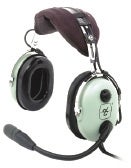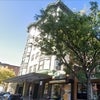Worcester Manufacturer Sues Electronics Giant Over Headset Hue
 An image of a pilot headset manufactured by David Clark Co.
of Worcester, taken from an online marketing document.
An image of a pilot headset manufactured by David Clark Co.
of Worcester, taken from an online marketing document.
What do Christian Louboutin high heels and a headset made by Worcester-based David Clark Co. have in common?
They have distinctive, trademarked colors their owners are willing to go to court to protect.
David Clark — which makes communications gear, space and aviation suits — filed suit last month in U.S. District Court in Worcester against Panasonic Corp., alleging that the Japanese electronics giant is infringing on its trademark by making and selling pastel green communication headsets. David Clark is asking for an injunction against Panasonic, plus damages and legal fees.
At the crux of the challenge are the "domes" of the headset, the round parts that go over the user's ears. David Clark has been making headsets with green domes since the 1970s and was awarded a trademark on the color in the use of headset domes in August 1993.
For some, the idea of trademarking a color might seem odd. But it turns out the practice is quite common across a range of industries, from manufacturing to high fashion. And numerous companies have sued to protect their colors.
But there are limits, explained Worcester patent and trademark attorney Gerry Blodgett. No one can register a color by itself. It has to be connected to a specific type of product and be an important part of what makes that product recognizable to the public.
"The trademark law is basically intended to protect consumers and make it so they can rely on some sign of where the product came from," Blodgett said. "The idea is basically that companies can't use trademarks unfairly in competition."
So, if a cell phone maker releases a green-and-yellow phone, heavy-equipment manufacturer John Deere wouldn't have grounds to sue for trademark infringement, though that color scheme is protected when it's used on its tractors.
David Clark's complaint highlights the fact that Panasonic could be misleading the public. It says Panasonic's green headset creates a strong likelihood that customers may be misled into thinking the Panasonic product is affiliated with or endorsed by David Clark.
A widely publicized lawsuit that wrapped up last year involved Christian Louboutin S.A., a maker of high-end women's footwear with distinctive red soles. Louboutin sued Yves Saint Laurent America Inc., accusing it of making and selling what Louboutin viewed as an imposter shoe — one that was all red, including the sole.
Louboutin appealed the case several times, and the lawsuit ended in somewhat of a draw — a U.S. appeals court judge ruled in September that Yves Saint Laurent's "monochromatic" (all red) shoe did not violate Louboutin's trademark, but said a shoe that had a red sole set against a different color would have violated the trademark.
Louboutins, which have been worn by various celebrities, sell for anywhere from several hundred dollars to $6,000. The company said in its lawsuit that Yves Saint Laurent's cheaper shoe was impairing its ability to control its reputation, quality and "careful distribution" of its own shoes.
Though in a totally different market, a parallel can be drawn between Louboutin trying to protect itself against imitators and David Clark seeking to do the same. The company's headsets retail online for $285 and up, while Panasonic's RP-HC200 model sells for about $40.
It's no surprise that Louboutin highlighted that its shoes have been in movies and on the covers of fashion magazines. Blodgett said plaintiffs often use media coverage of their products to prove their distinctiveness and public perception. In some cases, consumers are even surveyed to get an understanding of how well-recognized a product is, he said. That evidence can help show that the trademarked product and color have gained "secondary meaning," or a tangible reputation in the marketplace.
In the same way Louboutin talked up its media coverage, David Clark's complaint highlights its products appearance in popular culture. The company notes that the headsets are well recognized in the aviation industry and can also be spotted in televised football games, offering "considerable exposure to wide audiences."
A Panasonic spokesman said the company doesn't comment on litigation. Dennis Buzzell, a marketing manager at David Clark, said the company would not comment on the case at this time.
Blodgett said he wouldn't be surprised if the case doesn't get to the point in which a court rules on damages. For one, damages are difficult and time-consuming to calculate.
"Usually the damage part never gets done because the trademark owner's real interest is in stopping the unfair competition," Blodgett said.








0 Comments